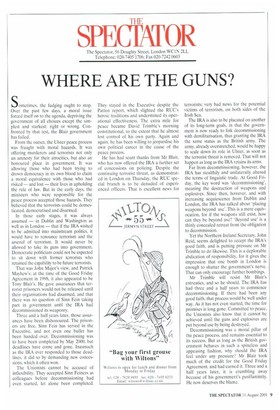SPECTATOR
The Spectator, 56 Doughty Street, London WC1N 2LL Telephone: 020-7405 1706; Fax 020-7242 0603
WHERE ARE THE GUNS?
Sometimes, the fudging ought to stop. Over the past few days, a moral issue forced itself on to the agenda, depriving the government of all choices except the simplest and starkest: right or wrong. Confronted by that test, the Blair government has failed.
From the outset, the Ulster peace process was fraught with moral hazards. It was offering murderers and terrorists not only an amnesty for their atrocities, but also an honoured place in government. It was allowing those who had been trying to drown democracy in its own blood to claim a moral equivalence with those who had risked — and lost — their lives in upholding the rule of law. But in the early days, the ministers who were responsible for the peace process accepted those hazards. They believed that the terrorists could be domesticated, democratised and disarmed.
In those early stages, it was always assumed — in Dublin and Washington as well as in London — that if the IRA wished to be admitted into mainstream politics, it would have to renounce terrorism and the arsenal of terrorism. It would never be allowed to take its guns into government. Democratic politicians could not be expected to sit down with former terrorists who retained the capability to be future terrorists.
That was John Major's view, and Patrick Mayhew's: at the time of the Good Friday Agreement in 1998, it also appeared to be Tony Blair's. He gave assurances that terrorist prisoners would not be released until their organisations had disarmed, and that there was no question of Sinn Fein taking part in government until the IRA had decommissioned its weaponry.
Three and a half years later, those assurances have been dishonoured. The prisoners are free, Sinn Fein has served in the Executive, and not even one bullet has been handed over. Decommissioning was to have been completed by May 2000, but deadlines have come and gone. Inasmuch as the IRA ever responded to those deadlines, it did so by demanding new concessions, which it often won.
The Unionists cannot be accused of inflexibility. They accepted Sinn Feiners as colleagues before decommissioning had even started, let alone been completed. They stayed in the Executive despite the Patten report, which slighted the RUC's heroic traditions and undermined its operational effectiveness. The extra mile for peace became David Trimble's morning constitutional, to the extent that he almost lost control of his own party. Again and again, he has been willing to jeopardise his own political career in the cause of the peace process.
He has had scant thanks from Mr Blair, who has now offered the IRA a further set of concessions on policing. Despite the continuing terrorist threat, as demonstrated in London on Thursday, the RUC special branch is to be denuded of experienced officers. That is excellent news for terrorists; very bad news for the potential victims of terrorism, on both sides of the Irish Sea.
The IRA is also to be placated on another of its long-term goals, in that the government is now ready to link decommissioning with demilitarisation, thus granting the IRA the same status as the British army. The army, already overstretched, would be happy to scale down its role in Ulster, as soon as the terrorist threat is removed. That will not happen as long as the IRA retains its arms.
Far from decommissioning, however. the IRA has stealthily and unilaterally altered the terms of linguistic trade. At Good Friday, the key word was 'decommissioning', meaning the destruction of weapons and explosives. Since then, however, and with increasing acquiescence from Dublin and London, the IRA has talked about 'placing weapons beyond use'. This is a mere equivocation, for if the weapons still exist, how can they be beyond use? 'Beyond use' is a thinly concealed retreat from the obligation to decommission.
Yet the Northern Ireland Secretary, John Reid, seems delighted to accept the IRA's good faith. and is putting pressure on Mr Trimble to do likewise. This is a deplorable abdication of responsibility, for it gives the impression that one bomb in London is enough to shatter the government's nerve. That can only encourage further bombings.
Mr Trimble will resist Mr Blair's entreaties, and so he should. The IRA has had three and a half years to commence decommissioning. If there had been any good faith, that process would be well under way. As it has not even started, the time for promises is long gone. Committed to peace, the Unionists also know that it cannot be achieved until the guns and explosives are put beyond use by being destroyed.
Decommissioning was a moral pillar of the peace process, and remains essential to its success. But as long as the British government behaves in such a spineless and appeasing fashion, why should the IRA feel under any pressure? Mr Blair took much of the credit for the Good Friday Agreement, and had earned it. Three and a half years later, it is crumbling away because of his government's pusillanimity. He now deserves the blame.


























































 Previous page
Previous page